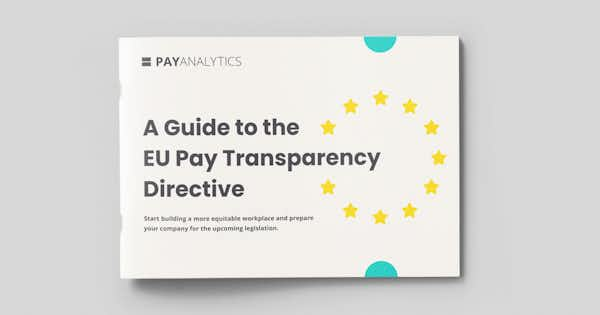Evróputilskipun um gagnsæi í launum | Sækja rafbók hér.

Spain — Pay equity analysis and reporting
With an eye to eliminating direct and indirect pay discrimination, Spain updated its pay equity legislation in 2021. All companies must now complete a remuneration register annually, and companies with 50 or more employees also need to do a job evaluation, a remuneration audit, and an equality plan.
Pay equity legislation in Spain
Several years ago, Spain reviewed its existing pay equity legislation and made some changes. The nation’s new legislation took effect in 2021.
Royal Decree 902/2020 uses specific measures to establish gender pay equity and eliminate both direct and indirect pay discrimination. It focuses on the concept of pay transparency as a way to ensure men and women are compensated equally for work of equal value. In fact, the legislation has specific requirements focused on equal pay for work of equal value, and it spells out how to classify job roles and how to analyze pay data by gender.
This decree establishes four key pay transparency tools:
- Remuneration register. This document contains aggregated and disaggregated pay data for all the organization’s employees. This is a way of identifying any unadjusted gender pay gaps.
A remuneration register is required for all companies of all sizes, including public administration organizations. The register should cover one calendar year and should be done annually. - Remuneration audit. This analysis of pay data focuses on finding any adjusted gender pay gaps. It also serves to identify how the employer can close these gaps.
This is obligatory for employers with 50 or more employees. However, smaller organizations may opt to conduct a remuneration audit as well. - Job evaluation system. This evaluation makes sure that job classifications are objectively based and do not perpetuate bias or discrimination. This tool is used to establish equal pay for work of equal value.
For companies with 50 or more employees, the job evaluation is mandatory and must be used in both the remuneration audit and the remuneration register. - Employee’s right to information. To uphold pay transparency, Spain’s law establishes that employees are entitled to information about pay.
In conjunction with Royal Decree 902/2020, Spain’s government also implemented Royal Decree 901/2020. This second decree concerns equality plans and how to register them. An equality plan is a document that helps to eliminate gender discrimination by specifying measures to ensure equal treatment of and equal opportunities for men and women. These equality plans are tied to companies’ remuneration audits. Within the equality plan, there is a diagnosis report that should contain the results of the remuneration audit, along with other measures.
An equality plan is required for employers with 50 or more workers. Organizations with fewer employees may also be required to do an equality plan, either by a collective agreement or as part of a sanctions process. Companies that are not required to create an equality plan can still do so voluntarily. Equality plans have a maximum duration of four years. After four years, a new analysis and remuneration audit should be conducted and a new equality plan created.
Once an equality plan is created, it needs to be publicly registered. As stipulated in Royal Decree 713/2010, registration is mediated through the Register of Collective Bargaining Agreements and Collective Labor Agreements. Equality plans should be filed according to annex 2.V of Royal Decree 901/2020 (see more information here). According to Article 9 of Royal Decree 901/2020, plans need to be evaluated and monitored regularly to determine whether the measures the company implements are effective.
If employers fail to meet these requirements, they could face hefty (six-figure) fines. They may also lose public benefits and bonuses for anywhere from six months to two years.
PayAnalytics support for remuneration register requirements
A remuneration register must include all the company’s employees. This includes management and senior management. The data must be broken down by a) gender and b) professional classification. Professional classification may include employees’ positions or job roles, professional categories, or jobs of equal value.
At the organization level, the remuneration register should include the mean and median of the following:
Base salary
Ordinary compensation components – this might include factors like education or seniority
Extraordinary compensation components, like overtime or travel required by the job
In the register, the data should be broken down to show each of the three elements above, along with the aggregated information (i.e., total compensation).
With only a few clicks, PayAnalytics can generate a remuneration register in Excel spreadsheet form. As input, users only need to provide the following data at the employee level:
Gender
Professional classification groups
Base salary and compensation components (ordinary and extraordinary)
The remuneration register does not need to be submitted to the government. However, employers must keep it on hand and ready for inspection upon request by any employee or by Spain’s ministry of labor. If the company’s employees have legal representatives, then employees are allowed to view the whole content of the remuneration register. Otherwise, employees can view only the overall percentages.
PayAnalytics support for equality plans and remuneration audits
In addition to creating the remuneration register, PayAnalytics can help companies fulfill Spain’s other pay equity requirements
First, PayAnalytics can be instrumental in the job evaluation component. The built-in job evaluation feature helps users establish any job’s value with objective, unbiased factors. In Spain, organizations with 50+ employees are required to perform a job evaluation to categorize jobs of equal value, then use that job evaluation to do their remuneration register and their remuneration audit.
Larger employers also have another obligation based on the remuneration register: any gender pay gaps of over 25% in the remuneration register must be justified. PayAnalytics can highlight how specific factors within an organization influence pay, and it gives insights into the compensation structure.
A remuneration audit requires companies to identify any gender-based pay inequality and make plans to address it by closing the pay gap. This requires them to analyze their pay data well, and PayAnalytics’ pay equity analyses provide full support for this audit. In addition to measuring the pay gap and giving an overview of the compensation structure, the software proposes raises targeted to specific employees in order to efficiently close the pay gap. (For more information on Spain’s remuneration audits, please see this guide.)
PayAnalytics also helps organizations create equality plans. These plans should meet the following requirements (see more information in Chapter 3 of Royal Decree 901/2020):
- Report with the results of a comprehensive analysis of equality and inequality within the company
- Remuneration audit results
- A plan for eliminating workplace discrimination, with specific steps and how they will be accomplished (including who is responsible and the planned timeline)
In order to begin making such a plan, it’s necessary to have a thorough understanding of what equality looks like within the company and what specific areas need work. This means a comprehensive analysis that may examine promotion practices, recruitment and hiring, representation of women in the company, and more. (See the Appendix of Royal Decree 901/2020 for more details.) PayAnalytics’ Workplace Equity feature can be instrumental in this analysis, giving users a clear picture of how the organization’s equity landscape has changed along with the employee population and how it looks now.
For organizations of all sizes and at any stage of their journey, PayAnalytics offers a holistic equity solution. Our software helps employers:
- Measure and close their pay gaps
- Preserve pay equity as compensation decisions are made, preventing gaps from returning
- Comply with pay equity reporting and analysis requirements
- Get a bird’s-eye view of equality within the organization and how it is changing over time
We’d be happy to speak with you about how PayAnalytics can help your organization meet the pay equity requirements in Spain. Please contact us at any time. We can also provide a demo of our software on request.





